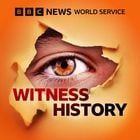
Witness History
Oct 14, 2025
In 1961, the Argentine poet and short story writer Jorge Luis Borges won the Formentor Prize for literature.
Borges’ stories were characterised by mind-bending plots often featuring labyrinths, dreams and fables.
Following his recognition in 1961, his reputation grew to such an extent that he is regarded as one of the most influential Latin American writers in history, as Ben Henderson reveals using BBC archive.
Eye-witness accounts brought to life by archive. Witness History is for those fascinated by the past. We take you to the events that have shaped our world through the eyes of the people who were there. For nine minutes every day, we take you back in time and all over the world, to examine wars, coups, scientific discoveries, cultural moments and much more. Recent episodes explore everything from the death of Adolf Hitler, the first spacewalk and the making of the movie Jaws, to celebrity tortoise Lonesome George, the Kobe earthquake and the invention of superglue. We look at the lives of some of the most famous leaders, artists, scientists and personalities in history, including: Eva Peron – Argentina’s Evita; President Ronald Reagan and his famous ‘tear down this wall’ speech; Thomas Keneally on why he wrote Schindler’s List; and Jacques Derrida, France’s ‘rock star’ philosopher. You can learn all about fascinating and surprising stories, such as the civil rights swimming protest; the disastrous D-Day rehearsal; and the death of one of the world’s oldest languages.
(Photo: Jorge Luis Borges in 1977. Credit: Sophie Bassouls/Sygma via Getty Images)

